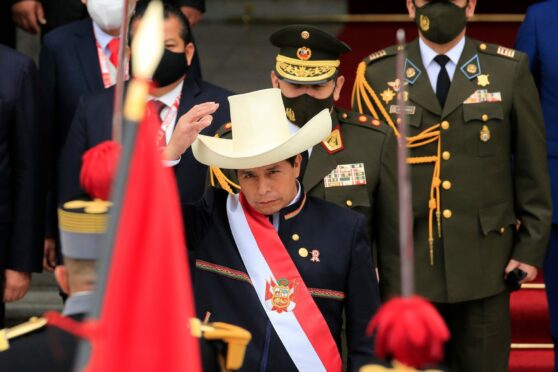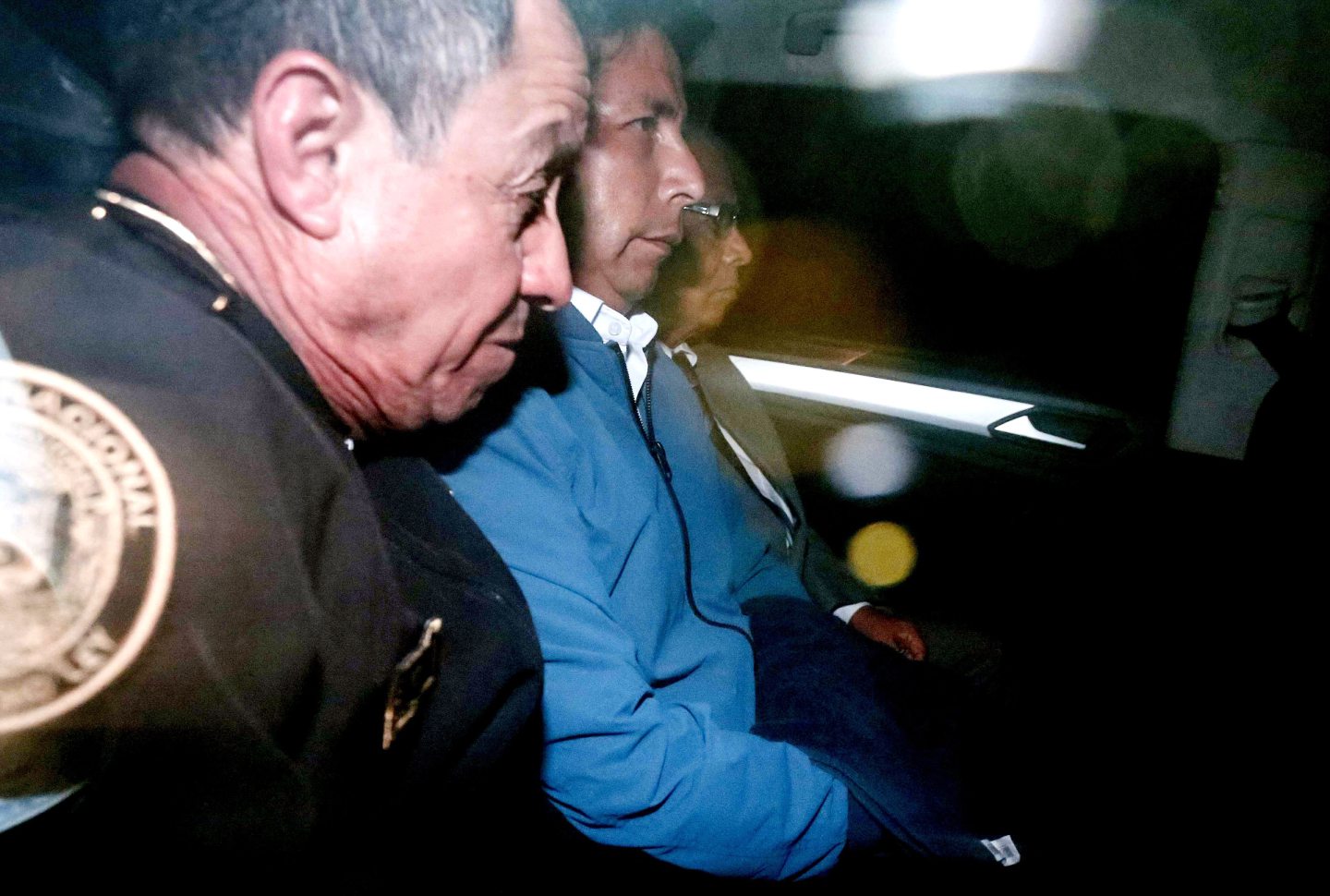
It was a scene echoing the worst clichés of Latin American political chaos: a president attempts to launch a coup live on TV, is rejected by the people before being arrested by police as he tries to flee.
It has been tumultuous times in Peru since Pedro Castillo tried to seize control in a power grab that went disastrously wrong.
Only 16 months before, the former Marxist schoolteacher was given the keys to the Peruvian presidential palace, ushering in what some hoped would be a new era in the country’s politics.
The hope that a man of the people had at last replaced the country’s political elite was crushed when Castillo was arrested and accused of staging a coup on Wednesday.
The 53-year-old had attempted to dissolve parliament and rule by decree but these efforts to stamp his authority on the volatile Latin American state were quickly crushed by lawmakers in the country’s Congress who voted him out of office in a day of high drama.
Analysts suggested Castillo’s lack of political experience, the opposition of powerful right-wing dominated Congress and accusations of corruption proved his undoing.
Castillo, who had no previous experience of high office, was elected as president by a slim margin of just 50,000 votes among the 18 million electorate in 2021.
When he arrived in office, some believed he might forsake his hard-left roots and become a centre-left moderate, as has happened elsewhere in Latin America, most notably in Colombia.
Instead, it took just less than two years for Castillo to reveal his inadequacies as a leader. It was not quite the spectacular fall from grace of Liz Truss, who crashed and burned within 44 days of becoming Prime Minister, but it was not far off.
The new president got through five cabinets and about 80 ministers. Some came and went in a weekly merry-go-round. Like Castillo, most lacked basic political skills.
To add to this, Castillo and some members of his family have been accused of corruption by the country’s chief prosecutor, who claimed they conspired to award public contracts. The former president denied the allegations and said he was a victim of political persecution.
“What has happened in Peru was due to Castillo’s mixture of inexperience, his lack of support in the country’s Congress and allegations of corruption,” Anna Ayuso, senior researcher in Latin American Studies at the Barcelona Centre for International Affairs, told The Sunday Post.
“Beyond his lack of ability to run the country is the culture of corruption that lies at the core of this country. This has been a problem for successive presidents, and it has partly caused the fall of Castillo, even though the allegations in this case were not so serious.”
Thirty years ago, another Peruvian president tried to do away with democratic norms and stage a coup with a little more success.
In 1992, Alberto Fujimori, an elected president, sent tanks to shut down Peru’s Congress and governed as a de-facto dictator for the following eight years. The public and the armed forces voiced its support for the coup – at least at first.
Fujimori was eventually forced to flee Peru and sought asylum in Japan but is now serving a sentence in prison in Lima for corruption.
When Castillo sought to do the same, it all came apart very quickly.
On Wednesday, he announced to the nation he would close Congress, convene a new one with powers to write a new constitution and reorganise the judiciary and the prosecutor’s office.
In a live television address to the country, Castillo appeared nervous. As he read out his speech, the paper he was holding was visibly shaking.
Lawmakers quickly dashed any hopes he had of taking power. Congress voted by 101 votes to six, with 10 abstentions, to dismiss him. The police moved quickly to arrest him for rebellion as he was being driven to the Mexican Embassy to seek asylum. He is now in custody in Lima while his lawyers attempt to persuade Mexico to give him a refuge.
Demonstrators quickly took to the streets with some supporting Castillo and others backing the Congress that impeached him.
“This is typical of our country where government after government is corrupt. They all steal from us,” Maritza Lopez, a cleaner who took part in the protests in Lima, told The Sunday Post.
There was international concern over the turn of events in this key Latin American state.
The European Union expressed its support for the “political, democratic and peaceful solution adopted by the Peruvian institutions” and urged “all actors to a dialogue that ensures stability”, according to a statement.
Antonio Guterres, the United Nations Secretary-General, called on all sides to “uphold the rule of law”.
President Dina Boluarte, Peru’s first-ever woman leader, has emerged from the embers of the chaos sparked by Castillo.
She took the oath of office within two hours of the impeachment vote and pledged to serve the rest of Castillo’s term until 2026.
Whether she lasts that long remains to be seen.
Boluarte called for “national unity” and urged lawmakers to put aside political differences for the good of the nation.
This was a tacit reference to the confrontation that had dogged Castillo’s left-wing government and the right-wing dominated Congress.
How the 60-year-old lawyer fills her first cabinet will be an indication of whether she is likely to survive in office. If she can muster enough support across the political panorama, she will be able to ward off a snap election.
But, without her own political party in Congress, she faces an uphill battle.
“She has no party in Congress, she is alone,” Peru’s former president Ollanta Humala, who was in office between 2011 and 2016, told Peruvian television.
“She does not have the tools to govern, she should call for an early election. Today’s truce will last a month or maybe more, but then the country’s big problems will come to the fore.”
Despite this, Keiko Fujimori, the daughter of the ex-president and a key political adversary of Castillo, pledged to support the new president.
“Let’s hope that the president appoints a broad-based cabinet, a very good cabinet and we must all do everything possible to make it work well,” she tweeted.
Peru will hold its breath to see who is running the country next week.
Meanwhile, as he awaits trial, Castillo will be sharing a Lima prison with Fujimori. The two should have much to talk about.

Enjoy the convenience of having The Sunday Post delivered as a digital ePaper straight to your smartphone, tablet or computer.
Subscribe for only £5.49 a month and enjoy all the benefits of the printed paper as a digital replica.
Subscribe © Renato Pajuelo/EPA-EFE/Shutterst
© Renato Pajuelo/EPA-EFE/Shutterst